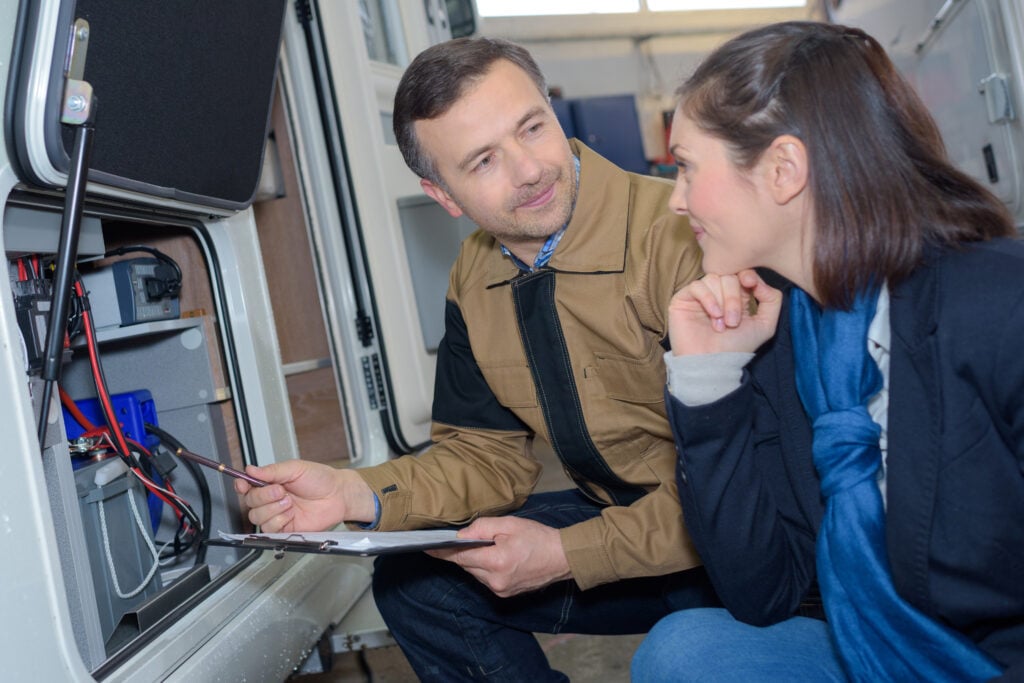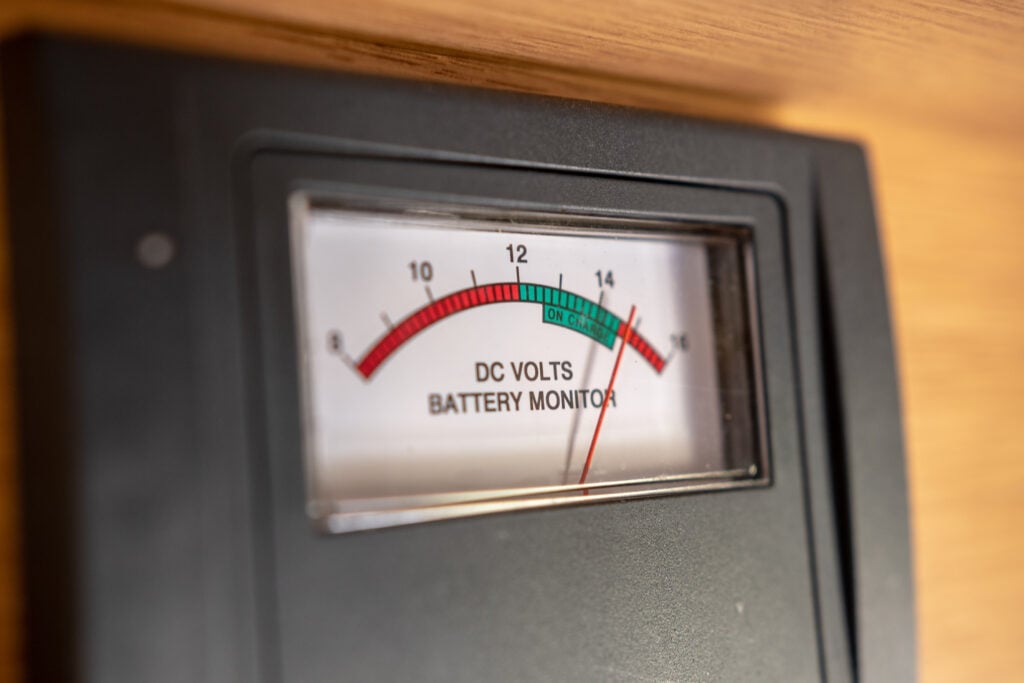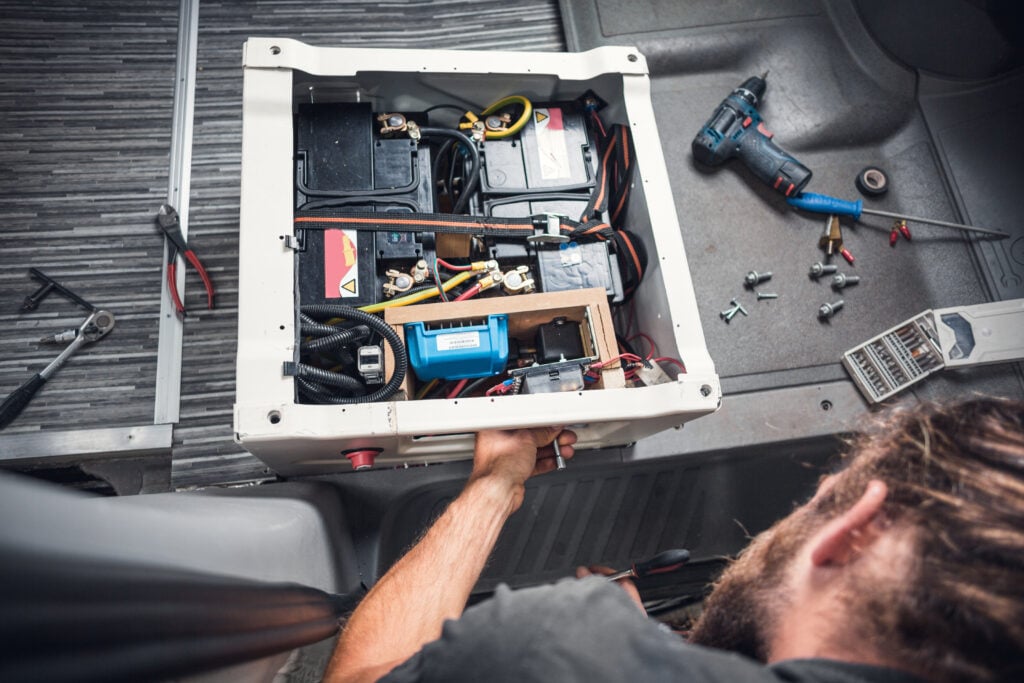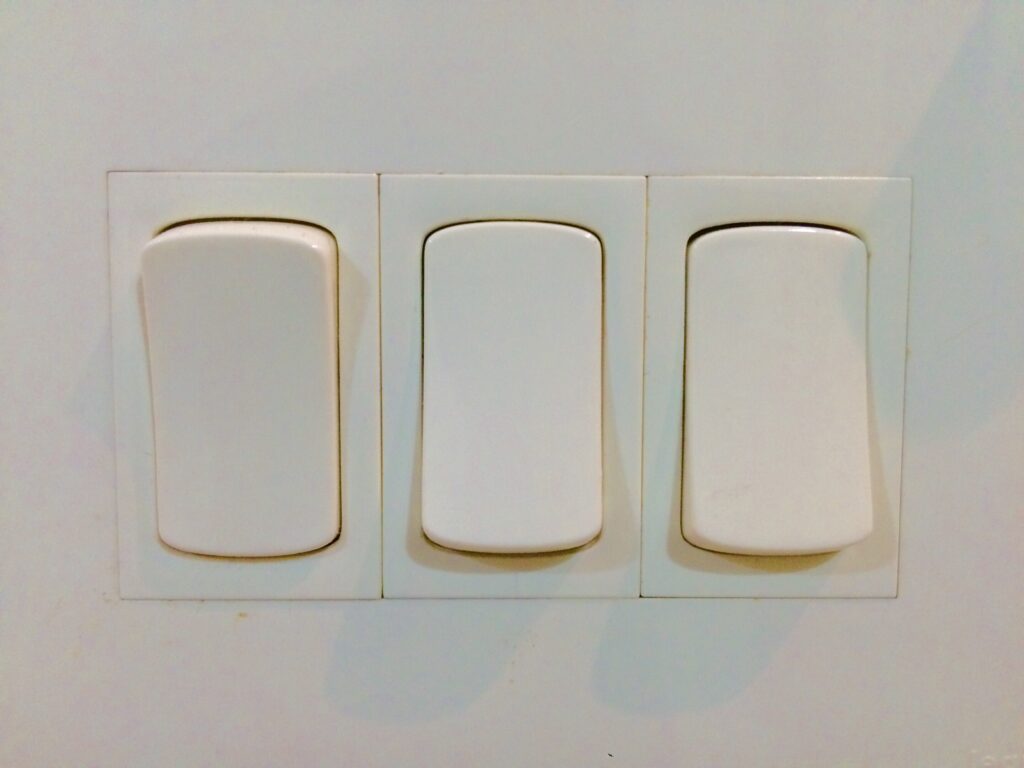You’ve seen the Instagram photos of RVs on the edge of canyons with travelers dangling their legs into the open air. You’ve seen the TikTok videos of RVers dancing in the moonlight in the middle of nowhere by a campfire. How do they do it? How did they get there? One of the first tasks any RVer has to undertake before boondocking is figuring out how long will an RV battery last while boondocking. Is one sufficient? What about two? More?
The topic of batteries and boondocking has piqued RVers’ interest as campgrounds quickly fill up. Some travelers want to get off-grid to explore remote areas, while others just want to avoid the hustle and bustle of RV parks. But how do you know if you have enough battery power to get you through a night or two? Let’s take a closer look at how long an RV battery will last while boondocking.
How Long Can You Boondock on a Standard RV Battery?
How long you can boondock will depend on the battery’s capacity and charge. Most standard 12V batteries will last a day or two. It also greatly depends on how much battery power you use. If you’re plugging in gadgets, kitchen appliances, and nightlights in every electrical outlet, you’ll go through that battery faster.

How Much Battery Power Do People Use on a Typical Day?
Battery usage on a typical day is highly variable based on season, location, and energy conservation. If you’re in Florida in July with air conditioning units running all day long, you’re going to use a lot more power than someone in Colorado in July. RVers who work full-time and need to sit at a computer all day will use more energy than travelers who don’t. A residential fridge will use a lot more power than a smaller fridge. The general rule of thumb is 20 kWh on a typical day.
How to Calculate Your Daily RV Power Usage
This will take some time, so it’s very helpful when determining how much power you need to boondock comfortably. First, make a list of all of the gadgets you use each day and for how long you use them. Write down the number of amps each gadget uses. You can usually find this on the device or user manual.
To figure out your usage and how long your RV battery will last while boondocking, you might have to use the calculation watts = amps x volts. For example, a 12V light bulb typically uses about 1.5 amps per hour. So if you have four lights on for approximately two hours, you will use about 12 amps. This will give you a rough estimate of how much daily RV power you use.

How Do You Charge Your RV Batteries?
There are two methods to charge your RV batteries. First, you can buy a battery charger. It should be high quality and deliver at least a 40-amp charge rate. When you run your generator for an hour, it will deliver 40 amps of power to your RV battery. The second method involves permanently installing a converter charger for solar panels. This type of charger will provide better performance, but the downside is it’s a permanent installation and more expensive.
Should You Buy Additional Batteries for Your RV?
This depends on how long and how often you want to boondock. Many choices RVers make are to fit their lifestyle. One RVer may invest in solar immediately after purchasing an RV because he plans on boondocking all the time. Another RVer may invest in skirting and electric heaters because she plans on being stationary in Minnesota through the winter. So our choices reflect the RV lifestyle we want. If you want to boondock often and for long periods, buy additional batteries.

Do RV Batteries Charge While You Drive?
They do but very little. To fully charge your RV batteries, you’ll need to hook up to an electrical source. This could be a generator while boondocking or a pedestal at a campground. The charge your batteries receive while driving is so little that you really shouldn’t count on it. You can’t rely on this when trying to calculate how long your RV battery will last while boondocking.
Tips to Reduce Your Power Consumption While Boondocking
It’s actually quite easy to reduce your power consumption. We use power without thinking about it most of the time. While boondocking, it’s important to keep up with your power consumption and save energy whenever you can.
Turn Off the Lights
Especially if it’s a nice day outside, open the windows and let the natural light seep in. Turn off the lights. Unplug all gadgets not in use. If you’re not using the alarm clock, unplug it for the day. Save your electrical usage for the evening when the sun goes down, and you truly need artificial light. You can also utilize LED rechargeable lights in flashlights and lanterns without using up any power.

Reduce Your Propane Usage
Save on propane by cooking inside the RV less. If you use the quick connect outside the RV for grilling, consider what meals you can eat without using the propane for a day. Set the thermostat to a lower temperature at night. You can use blankets if it gets chilly. You can also add insulation around windows and doors. By reducing your propane usage, it will last longer.
Turn Off Your Water Pump
Don’t leave your water pump on at night. You may also want to turn off the water heater. You aren’t using water while you sleep, so turning off the water pump saves energy. Because the water heater needs to pressurize before heating, it could burn up if you leave it on and turn off the water pump. So by turning off both the water pump and water heater, you’re also protecting your water heater.
Prepare Properly for Boondocking
Figuring out how much power you use in a day can be time-consuming. But it’s necessary if you want to know how long your RV battery will last while boondocking. Just hitting the desert without any idea of how much battery power you have and how long it will last you is not a smart decision. You might have to fork out some additional funds upfront, but if boondocking is your dream, then it’s worth it.


Leave a Reply